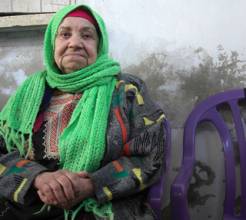 HelpAge International is very concerned for the safety of the 60,000 people in the Gaza strip aged 60 and over, including 4,000 who live alone. Many have difficulty walking or have chronic illnesses that limit their mobility.
HelpAge International is very concerned for the safety of the 60,000 people in the Gaza strip aged 60 and over, including 4,000 who live alone. Many have difficulty walking or have chronic illnesses that limit their mobility.
Their ability to escape dangerous situations and to access essential healthcare and other services is very limited.
In addition, health facilities are seriously understaffed as staff are unable to move safely between their homes and the health facilities, and there is a shortage of essential medication and medical supplies.
Trapped in their houses
“Many older people have been have been trapped in their houses for days,” says Dr Sonja van Osch, HelpAge’s representative in the occupied Palestinian territories.
“They are running out of food and medications and have limited or no access to health facilities. They are scared out of their wits by the constant shelling. Even if they could move, there is no safe place to run to.”
Older people are disproportionately at risk in the conflict. Casualty data provided by the World Health Organization (WHO) shows that over 9% of those killed in the current hostilities in Gaza are aged 60 and over, although they represent only 3.7% of the population.
Extremely difficult to reach the most vulnerable
Under international humanitarian law, older people are protected as persons not participating in the hostilities and they are also entitled to special protection because of their weakened condition. While hostilities continue, it is extremely difficult for HelpAge International and other humanitarian aid providers to reach vulnerable people.
HelpAge International calls on the parties to the conflict to allow essential humanitarian aid to be provided to the civilians of Gaza, in particular to the most vulnerable people such as older people.
